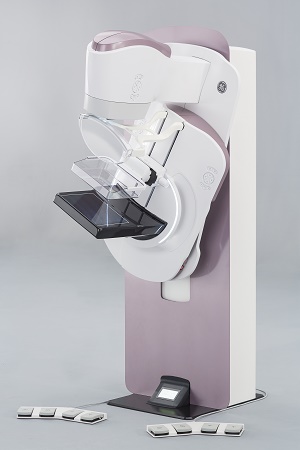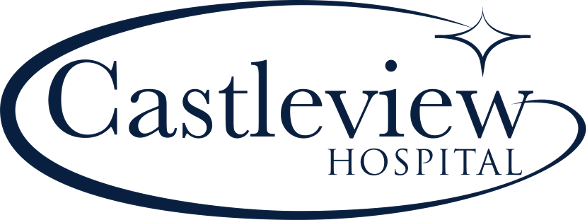A More Comfortable Mammography Experience for Women
October 26, 2020
Castleview Hospital upgrades to 3D mammography in mid-November
Here are a few words that rarely go together: relaxed, comfortable, and mammogram. After all, having your breasts compressed tightly between two firm surfaces while you stand there awkwardly half-clothed is certainly not the most pleasant of experiences. Some patients even call it the “smashogram”.
That’s why in mid-November Castleview Hospital will begin offering women a new option in mammograms: the Senographe Pristina™. Designed from the ground up with input from women, it is the first mammography system to provide women with the “three Cs”: comfort, confidence, and clarity.
Even the machine itself is designed to resemble not just a piece of medical equipment, but a piece of art, with rounded edges and elegant lighting. But the design is more than just aesthetic; the gentle, rounded corners of the image receptor, where the woman places her breasts, completely changes the stance of the traditional mammogram. Instead of tensing their pectoral muscles while grabbing the traditional handgrips – which can make it hard to acquire high-quality images – women can lean comfortably on the armrests, relaxing their muscles to simplify positioning, compression, and improve image quality. The image receptor is also thinner than the previous design, so it doesn’t jab into a woman’s ribs.
By improving patient comfort, technologists can focus on precise positioning, potentially making the exam easier and faster. Poor positioning is a leading cause of retakes, and the lack of proper positioning may decrease mammography sensitivity.[1]
With Senographe Pristina, Castleview Hospital can now bring 3D technology to patients. This technology, also known as digital breast tomosynthesis, delivers superior diagnostic accuracy at the same low dose as a 2D mammography exam, the lowest patient dose of all FDA–approved 3D mammography systems.[2]
Minimizing the Pain
 The Castleview radiology team invested in the Senographe Pristina because they know the primary reason women dread and even skip screening mammograms is pain. In one study, researchers found that 46 percent of women skipped their regular mammograms because the first one hurt too much.[3] In another published study, researchers interviewed 2,600 women about their experience with a screening mammogram and found that 10-15 percent experienced “moderate to severe” levels of distress or pain.[4]
The Castleview radiology team invested in the Senographe Pristina because they know the primary reason women dread and even skip screening mammograms is pain. In one study, researchers found that 46 percent of women skipped their regular mammograms because the first one hurt too much.[3] In another published study, researchers interviewed 2,600 women about their experience with a screening mammogram and found that 10-15 percent experienced “moderate to severe” levels of distress or pain.[4]
But if women skip their screening mammogram, they could be putting their lives at risk. Castleview is bringing the Senographe Pristina to the hospital ‐ because they believe that a test that could save a woman’s life shouldn’t hurt.
“Early detection of breast cancer can be lifesaving,” states Cindy Rowley, director of radiology at Castleview Hospital. “Upgrading our technology will provide a better and more comfortable experience for women. We are excited to offer 3D mammography to our community starting in mid-November.”
Castleview Hospital’s mammography department is currently closed as the new technology is being installed. However, Castleview is currently scheduling appointments for mid-November. As recommended by the American College of Radiology and Society of Breast Imaging, women should have an annual mammogram starting at the age of 40. Talk to your doctor about scheduling a 3D mammogram. To learn more visit CastleviewHospital.net.
[1] Taplin SH, Rutter CM, Finder C, et al. Screening Mammography: Clinical Image Quality and the Risk of Interval Breast Cancer. AJR 2002; 178: 79
[2] GE screening protocol consists of 3D CC/MLO + V-‐Preview CC/MLO, V-‐Preview is the 2D synthesized image generated by GE Seno Iris mammography software from GE DBT images. FDA PMA P130020/S002 http://www.accessdata.fda.gov/scripts/cdrh/cfdocs/cfPMA/pma.cfm?id=P130020S002, Data on file.
[3] Elwood M1, McNoe B, SmithT, et al. Once is enough-‐-‐why some women do not continue to participate in a breast cancer screening programme.N Z Med J. 1998 May 22;111(1066):180-‐3.
[4] Drossaert CH1, Boer H, Seydel ER. Monitoring women's experiences during three rounds of breast cancer screening: results from a longitudinal study.J Med Screen. 2002;9(4):168-‐75.
